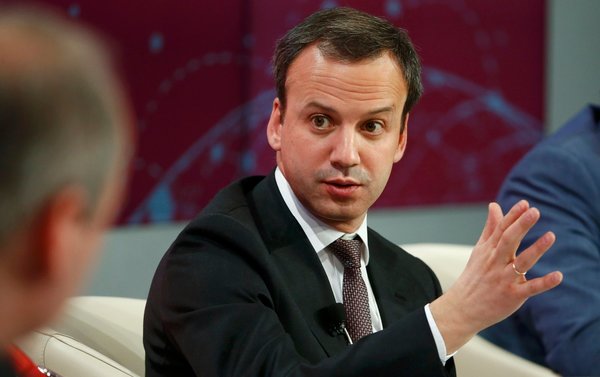DAVOS, Switzerland — Fear is back in the valley of the privileged.
瑞士达沃斯——在这座权贵云集的山谷里,担忧的情绪又回来了。
Financial instability is again a prime source of anxiety for participants at the World Economic Forum after receding last year. Russia and Ukraine, cheap oil, volatile currency markets, deflation, terrorism and even Switzerland are unsettling the global economy and sowing nervousness among the people attending the forum, many of them bankers or investors.
在今年的世界经济论坛(World Economic Forum)上,金融动荡再次成为令与会者心焦的一个主要原因,而去年的时候,这种担忧一度消散。俄乌关系、低油价、动荡的货币市场、通货紧缩、恐怖主义乃至瑞士都在扰乱全球经济,并在出席本次论坛的人们心中植入了不安。与会者中,有不少是银行业高管或投资人。

The sense of being blindsided by events was summed up by David M. Rubenstein, co-chief executive of the private equity firm Carlyle Group. He told the audience at a panel on Wednesday that they should take everything he said with a grain of salt because his predictions last year were way off.
私募公司凯雷投资集团(Carlyle Group)的联席首席执行官戴维·D·鲁宾斯坦(David M. Rubenstein)对这种猝不及防的感觉进行了总结。在周三的一场讨论会上,他告诉观众,自己讲的话不可全信,因为他去年的预测就错得离谱。
“I wouldn’t have predicted oil prices would go down,” Mr. Rubenstein said. “I wouldn’t have predicted U.S. growth would be as strong as it has been, I wouldn’t have predicted the slowdown in some of the emerging markets, I certainly wouldn’t have predicted deflation in Europe.”
“我没有料到油价会下行,”鲁宾斯坦说。“我没有料到美国的增长会如此强劲,我没有料到一些新兴市场增速放缓,我也绝没有料到欧洲会出现通缩。”
The sense of nervousness has been heightened by the terrorist attacks in Paris earlier this month. Security at the World Economic Forum, which every year turns the town into a virtual military protectorate, was tightened even further. In a new practice, the Swiss police shined flashlights into the shuttle vans that bring participants to hotels and events, requiring passengers to show their credentials.
本月早些时候巴黎爆发的恐怖袭击令这种惴惴不安的感觉进一步加深。世界经济论坛每年都会让这座小城变得形同军事堡垒,而这次的安保工作又更上一层楼。瑞士警察采取了一种新措施,会向运送与会者在酒店和活动场馆之间穿梭的巴士闪灯,提示乘客展示自己的证件。
“It’s that fear factor,” Anne Richards, chief investment officer of Aberdeen Asset Management, said in an interview. “What is going to hit now?”
“就是这种担忧因素,”安本资产管理(Aberdeen Asset Management)的首席投资官安妮·理查兹(Anne Richards)接受采访时说。“现在又会出现哪种冲击呢?”
Even recent economic events that are mostly positive create instability, panelists said. The plunge in oil prices is great for consumers, but has undercut the Russian economy, with repercussions for Europe. Mr. Rubenstein said that Russian companies had borrowed $650 billion from Western countries, mostly European banks.
参会者表示,就连看来最正面的一些近期经济事件也带来了动荡。油价暴跌对消费者来说是件好事,但它削弱了俄罗斯经济,从而间接影响到欧洲。鲁宾斯坦称,俄罗斯企业从欧洲国家借走了6500亿美元(约合4万亿元人民币),而主要的出借方是欧洲的银行。
“If the Russian companies, because of their economies, can’t service that debt, that’s going to be a problem,” he said.
“假如俄罗斯的公司,因为他们国家的经济困难而没有能力偿债,那么就会构成问题,”他说。
Douglas Flint, chairman of HSBC Holdings, noted that when regulators tested the resiliency of banks this year, none considered situations in which oil was $50 a barrel. “The last several years have taught us to expect the unexpected and to prepare for the worst,” Mr. Flint said at a different panel discussion.
汇丰控股有限公司(HSBC Holdings)的董事长范智廉(Douglas Flint)指出,当监管机构上次对各大银行进行压力测试时,没有任何人考虑到油价为每桶50美元的情景。“这几年给我们的教训是,准备迎接意外,做最坏的打算,”范智廉在另一场讨论会上表示。
The discussions came a day before the European Central Bank was expected to announce that it would begin broad-based bond purchases to try to stimulate the European economy. But there was pessimism that central banks could continue to rescue global economies.
周三的这些讨论发生在欧洲央行(European Central Bank)展开行动的头一天。外界估计,该行会宣布启动一项覆盖面甚广的债券购买计划,尝试以此刺激欧洲经济。然而,对于各大央行能否持续拯救全球经济,会上存在悲观情绪。
“We are looking forward to the E.C.B. announcement tomorrow,” said Min Zhu, deputy managing director of the International Monetary Fund.
“我们在期待欧洲央行明天的声明,”国际货币基金组织(International Monetary Fund)副总裁朱民称。
But he said that the eurozone economy required policies to stimulate demand, like spending on public infrastructure or changes in laws that restrict hiring and firing. “Interest rates are zero already. What do they do?” Mr. Zhu said of central banks. “We need supply-side policies.”
不过,他表示欧元区经济还需要刺激需求的政策,比如增加公共基础设施建设方面的开支,或是改革限制雇佣与解聘的法规。“利率已经是零了。我们还能做什么?”谈到各大央行时,朱民问道。“我们需要供给经济学方面的政策。”
Even a month ago, no one would have predicted that Switzerland, one of the wealthiest and most stable countries in the world, would become a subject of concern. But the country faces an economic crisis after the Swiss National Bank last week abandoned attempts to check the rise of the Swiss franc against the euro. The franc has risen 20 percent against the euro since then, an increase that made the stay in Davos even more costly than usual and, more important, threatened the competitiveness of Swiss industry.
就在一个月前,还无人能料到,身处世界上最富裕、最稳定国家之列的瑞士会成为大家担忧的对象。可是上周,瑞士国家银行(Swiss National Bank)放弃了控制瑞士法郎兑欧元汇率的做法,一场经济危机随即摆在了该国面前。自那以后,瑞郎对欧元升值了20%。这样的涨幅让奔赴达沃斯参会的花销更胜以往,但更重要的是,它威胁到了瑞士各大行业的竞争力。
Axel Weber, chairman of the Swiss bank UBS, said the Swiss central bank “did the right thing” in acknowledging that it could no longer keep a cap on the franc. He predicted that the Swiss currency would retreat from current levels.
瑞银(UBS)董事长埃克塞尔·韦伯(Axel Weber)认为,瑞士央行承认已无力承担对瑞郎设限“是正确之举”。他预测,瑞郎将会从当前的水平上贬值。
“There are challenges and pressures, but I think they are manageable,” said Mr. Weber, the former president of the Bundesbank, the German central bank.
“当前存在一些挑战和压力,但我认为是可控的,”韦伯说。他曾担任德国央行德国联邦银行(Bundesbank)的行长。
But he was pessimistic about Europe. Noting that he had appeared at a panel called, “Is Europe Back?” last year at the forum, he said this time around, “Europe’s not back,” adding, “The problems are back.”
不过,他对欧洲持总体悲观的态度。韦伯指出,他去年曾在达沃斯出席一场名为《欧洲是否已经回归?》的讨论会,而到了今年,“欧洲并没有回归,问题却回归了。”
A hint of geopolitical tension, in the otherwise convivial atmosphere at the gathering, emerged at a panel sponsored by The Wall Street Journal that examined why economies and financial markets have become more volatile. Arkady Dvorkovich, deputy prime minister of Russia, was critical of the United States.
世界经济论坛通常氛围轻松,但在《华尔街日报》(The Wall Street Journal)资助的一场讨论会上,地缘政治冲突初现端倪。会议关注的是各大经济体与金融市场为何变得更为动荡。俄罗斯副总理阿尔卡季·德沃尔科维奇(Arkady Dvorkovich)对美国展开了批评。
“The problem with American growth, it is more at the expense of other countries sometimes,” said Mr. Dvorkovich, who also called sanctions imposed on Russia in retaliation for its behavior in Ukraine “stupid.”
“美国经济增长的问题在于,有时候更多地以别国为代价,”德沃尔科维奇说。对于为了报复俄罗斯在乌克兰所作所为而施加的制裁,他也直呼“愚蠢”。
Still, some experts said the gloom was overdone. “The rest of the world will recover over time,” Kenneth Rogoff, an economics professor at Harvard University, said on the same panel. “These things don’t last forever.”
虽说如此,还是有专家认为目前的阴郁情绪过了头。“随着时间的推移,世界其他地方也会复苏,”哈佛大学(Harvard University)经济学教授肯尼斯·罗格夫(Kenneth Rogoff)在同一场讨论会上说。“这些事情不会没完没了。”












